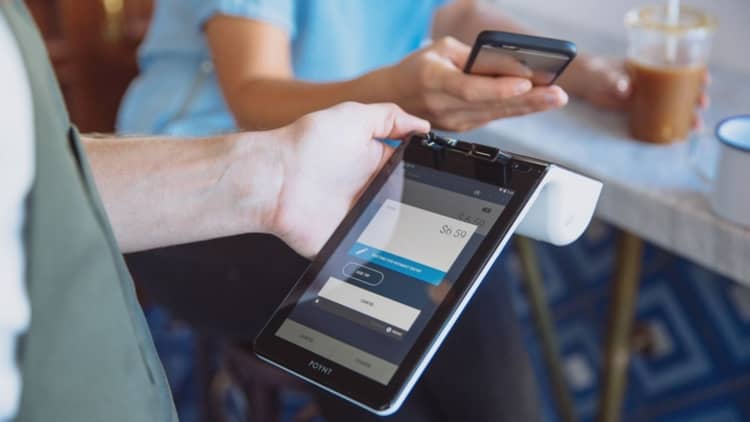
Those old clunky payment terminals at retail checkout lines are getting a reboot.
Businesses have no choice. Because of new rules to protect consumers from fraud, U.S. companies that still rely on credit cards with magnetic strips to process payments are liable for counterfeit charges. Chip cards are the new standard.
On top of that, consumer behavior is shifting. Apple and Google are both supporting tap pay with near field communication (NFC), QR codes are popular in some places, and payments via WiFi and Bluetooth are on the way.
For Osama Bedier, who spent nine years at PayPal before creating Google Wallet, it's the paradigm shift that he's long awaited. His start-up Poynt, founded in 2013, is going head-to-head with industry leaders VeriFone and Ingenico by building a terminal on top of the Android operating system that can accept any type of payment.
Like smartphones and tablets, Poynt has an app store so that the restaurant, ice cream shop or wine store can add the software most relevant to its business without purchasing a separate system.
"We don't want the merchant to wonder whether they bought the right solution," Bedier said in an interview. "We have a device that works with every emerging payment technology."
To get its terminal into the market, Poynt is partnering with banks that have existing relationships with merchants. The company has already announced deals with Chase Paymentech, a unit of JPMorgan, and Vantiv. Preorders started in late 2014 for $299.
Bedier told CNBC that eight additional U.S. financial service providers are distributing the terminal, and that Poynt has presold almost 500,000 devices currently being manufactured in China. In October, Poynt raised $28 million in venture funding to accelerate development.
Poynt has no intention of making money from the hardware, which Bedier said will be commoditized over time and face a long list of "copy cats." Rather, the company is mimicking the consumer app store model and taking 20 percent of the revenue when a merchant buys a piece of software for the device.
Poynt competitors
| Company | Terminal | Investors |
| Square | iPad / smartphone | public |
| Revel | iPad | venture |
| ShopKeep | iPad | venture |
| Clover | proprietary | First Data (acquired) |
| Lavu | iPad | venture |
That model faces some pretty hefty risks, says Rick Oglesby, a partner at Double Diamond Payments Research.
Poynt has to be seen as a popular enough product for developers to devote resources to it. Without a vibrant app ecosystem, there's no way for Poynt to generate profit.
The other half of the equation is that merchants must be amenable to downloading apps. Poynt's bet is that technology buyers want the same type of experience at work that they have in their personal lives, and that apps are now the way we consume software.
Read MoreOne VC prediction for 2016
"It has huge potential because it's unique and a very smart and intelligent way to get distribution for terminals," said Oglesby. "But they could put millions out there and not make any money. If the software play doesn't take off, the business is out of luck."
ShopKeep is the type of developer Poynt needs on board. The New York-based start-up has built up relationships with 20,000 small and medium-sized businesses, such as bakeries, bars and food trucks.
ShopKeep sells a point-of-sale system on an iPad, building in functions like reporting and inventory management, and uses Ingenico's card-swiping hardware. The service costs $59 a month per register.
The only reason ShopKeep would build its service for the Poynt store would be if merchants are asking for it. Etie Hertz, ShopKeep's senior vice president of payments, says he's not yet seeing that demand.
"Theoretically, if someone has 500,000 merchants, that's tremendous scale and to be able to build software for that base would be attractive to anyone today," Hertz said. But, "we haven't seen them in the market."
ShopKeep is just one of a number of tablet-based point-of-sale systems. Square is the biggest among micro merchants, and others competing with ShopKeep include Revel, Lavu and Clover, owned by First Data. Beyond that, the market is filled with POS systems running on PCs.
One area where Poynt has no interest in making money is in payments themselves. Square, for example, charges 2.75 percent of a transaction for in-store payments, and out of that revenue has to turn around and pay an interchange fee to the payment card network.
Square generates gross margins of over 30 percent with that model, but Bedier said profit is much harder to come by when dealing with larger merchants, which have more power to push down prices.
"Making money on payments at big retailers is hard and will get a lot harder," Bedier said.
As for the competitive landscape, Bedier isn't so worried about being later to the game. By his estimate there are 120 million payment terminals in the world today and that number is growing to 350 million over the next five years.
That's more than enough opportunity to capture businesses as they upgrade from old systems. And with market share gains, developers are likely to follow.
"We're interested in getting as many out there as possible and enabling small businesses," Bedier said








